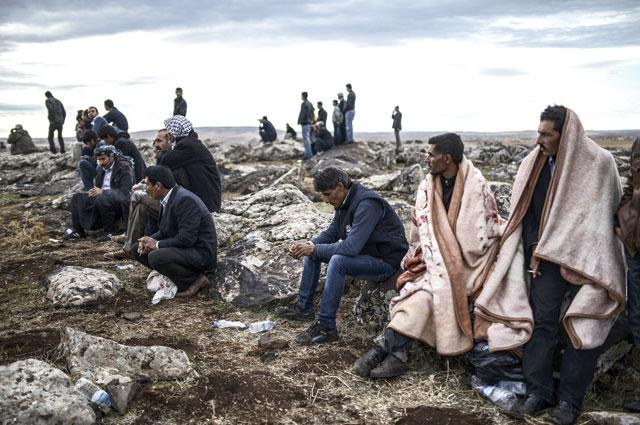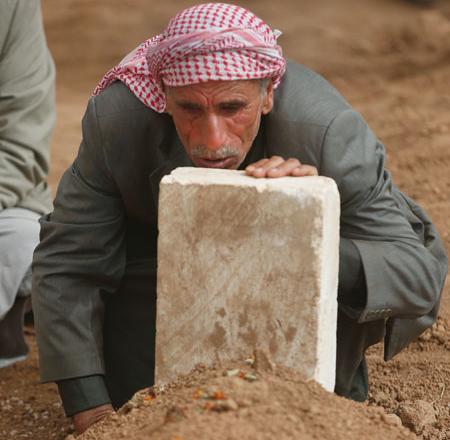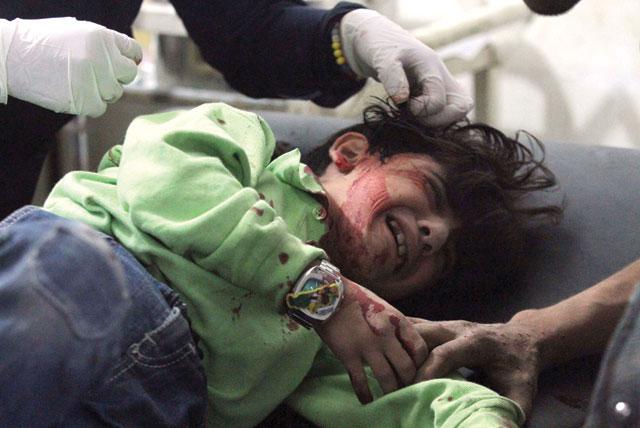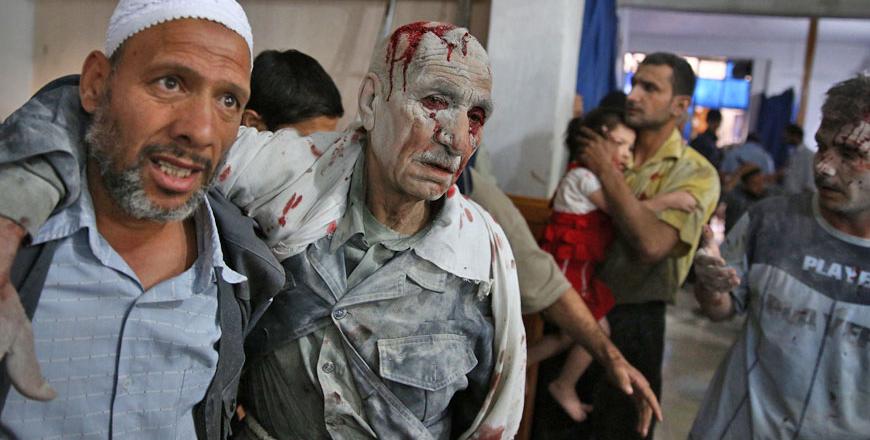You are here
Fiercest fighting in days hits Syrian border town
By Reuters - Oct 19,2014 - Last updated at Oct 19,2014

URFA, Turkey — The fiercest fighting in days shook the Syrian border town of Kobani overnight as Islamic State (IS) fighters attacked Kurdish defenders with mortars and car bombs, sources in the town and a monitoring group said on Sunday.
IS, which controls much of Syria and Iraq, fired 44 mortars at Kurdish parts of the town on Saturday and some of the shells fell inside nearby Turkey, according to the British-based Syrian Observatory for Human Rights. It said four more mortars were fired on Sunday.
The month-long battle for Kobani has ebbed and flowed. A week ago, Kurds said the town would soon fall. The United States and its coalition partners then stepped up air strikes on IS, which wants to take Kobani in order to strengthen its position in northern Syria.
The coalition has been bombing IS targets in Iraq since August and extended the campaign to Syria in September after IS, a group that espouses a rigid interpretation of Islam and initially fought Syrian President Bashar Assad’s forces, made huge territorial gains.
Raids on IS around Kobani have been stepped up, with the fate of the town seen as an important test for US President Barack Obama’s campaign against the Islamists.
NATO member Turkey, whose forces are ranged along the border overlooking Kobani, is reluctant to intervene. It insists the allies should also confront Assad to end Syria’s civil war, which has killed close to 200,000 people since March 2011.
“We had the most intense clashes in days, perhaps a week, last night [IS] attacked from three different sides including the municipality building and the marketplace,” said Abdulrahman Gok, a journalist in Kobani.
“Clashes did not stop until the morning. We have had an early morning walk inside the city and have seen lots of damaged cars on the streets and unexploded mortar shells,” he said.
Car bombs
The observatory reported two IS car bombs hit Kurdish positions on Saturday evening, leading to casualties. A cloud of black smoke towered over Kobani on Sunday.
A fighter from one of the female units of the main Syrian Kurdish militia in Kobani, YPG, said Kurdish fighters were able to detonate the car bombs before they reached their targets.
“Last night there were clashes all across Kobani... this morning the clashes are still ongoing,” she said, speaking on condition of anonymity.
The observatory said 70 IS fighters had been killed in the past two days, according to sources at the hospital in the nearby town of Tel Abyab, where IS bodies are taken. Reuters cannot independently confirm the reports due to security restrictions.
The observatory said some Syrian Arab fighters from the Revolutionaries of Raqqa Brigade, who are fighting alongside Kurdish fighters, had executed two IS captives.
“One was a child of around 15 years old. They shot them in the head,” he said.
IS have also used executions throughout their campaigns in Syria and Iraq, killing hundreds of enemy combatants and civilians who oppose their cause, according to IS videos and statements.
Welat Omer, a doctor caring for the few remaining civilians in Kobani, told Reuters by telephone that he was looking after 15 patients, including children and the elderly.
“We need medicine, including antibiotics and milk for the children, and medicine for the elderly, who have heart conditions, diabetes and high blood pressure,” Omer said.
Hundreds of thousands have fled IS’ advance. Turkey hosts about 1.5 million Syrian refugees, including almost 200,000 Syrian Kurds from Kobani.
Ankara has refused to rearm beleaguered Kurdish fighters, who complain they are at huge disadvantage in the face of IS’ weaponry, much of it seized from the Iraqi military when the militants took the city of Mosul in June.
Turkey views the YPG with suspicion for its long-standing links with the Kurdistan Workers Party (PKK), which has waged a 30-year armed campaign for self-rule in Turkey.
President Recep Tayyip Erdogan was quoted in the Turkish media on Sunday as saying Ankara will never arm the YPG through its political wing, the PYD.
“There has been talk of arming the PYD to establish a front here against IS. For us, the PYD is the same as the PKK, it’s a terrorist organisation,” he was quoted as saying.
This stance has sparked outrage among Turkey’s own Kurds, who make up about 20 per cent of the population. Riots in several cities earlier this month left more than 35 people dead.
In a call with Erdogan on Saturday night, Obama expressed appreciation for Turkey hosting over a million refugees, including thousands from Kobani.
“The two leaders pledged to continue to work closely together to strengthen cooperation against ISIL [Islamic State],” the White House said.
Obama’s approach to IS has drawn fire from his political opponents at home.
“We have dropped a bomb here and a missile there, but it has been a photo-op foreign policy,” US Senator Ted Cruz of Texas, a Republican and a potential presidential candidate in 2016, said on CNN’s “State of the Union” show.
He criticised Obama for delays in aiding Kurdish fighters in desperate need of weapons and assistance.
Related Articles
Kurdish forces defending Kobani urged a US-led coalition to escalate air strikes on Islamic State (IS) fighters who tightened their grip on the Syrian town at the border with Turkey on Saturday.
Turkey said on Monday it would allow Iraqi Kurdish fighters to reinforce fellow Kurds in the Syrian town of Kobani, while the United States air-dropped arms for the first time to help the defenders resist an Islamic State (IS) assault.
BEIRUT — Daesh militants re-entered Syria’s Tal Abyad Tuesday, seizing a district from the Kurdish forces who captured the border town in a



















